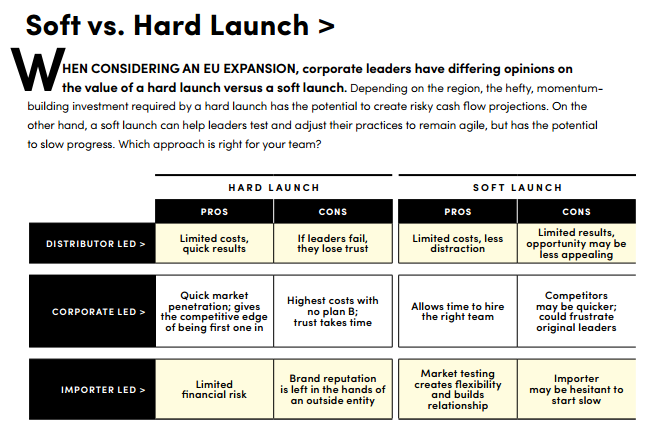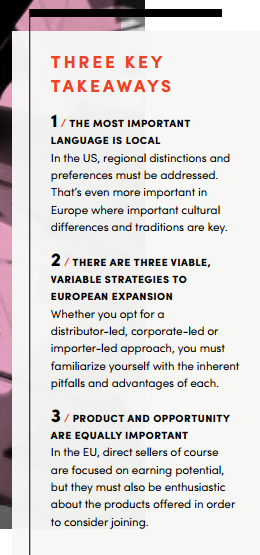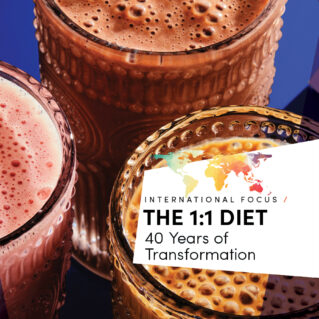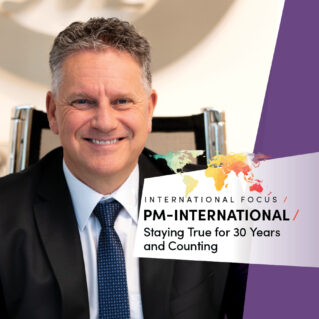Three proven approaches to help your US-based company find its footing in the European Union.

France, Germany, Italy and Poland alone accounted for more than $30 billion in industry retail sales in 2022. The European Union (EU) is a massive market opportunity for US-based companies interested in establishing a stronger international footprint.
While there are plenty of challenges, the US offers a unique competitive advantage in their proclivity for storytelling and innovative digital resources. When Younique launched in the EU, for example, their replicated websites and live social shopping were unheard of in the region. Those tools are now industry standard in the EU, but were, at the time, a competitive edge that drew new distributors to an out-of-town brand.
For companies wanting to make a name for themselves in the EU, the common starting line is addressing the language barrier. And rightly so. Clear communication is a key component for success. In fact, EU regulations require that all client-facing information be written clearly in the language of the country where it is presented. That includes product labels, legal documents, order forms and terms of service. Companies who take those efforts a step further to localize digital assets like websites, social platforms and sales aids tend to gain more credibility and trust among distributors.
Curiously, many companies operate as though the differences between launching into European markets ends with language, when, in fact, each market within the EU should be treated as its own unique entity. Europe is not one monolithic market. US-based companies who view the EU as a homogeneous region tend to follow a similar, ineffective pattern that includes expanding all over Europe rather than focusing on major markets. For those who do prioritize major markets, many assume what works in one European country will work in another. This is a strategy for failure.

Three Proven Expansion Strategies
In my experience, US-based companies who find success in the EU follow one of three expansion patterns.

1 / Distributor-led Expansion
Provided that cross-border sponsoring is permitted in your company’s compensation plans, allowing skilled field leaders to expand from one country to another can be a powerful way to introduce your brand to a new audience. Career leaders see untapped territory as a gold mine, particularly in border regions. Top leaders in Germany will attract distributors in France, The Netherlands, Belgium, Luxembourg, Poland, Denmark and so on, which can create a gold rush of leaders into new markets. Tailored bonuses and incentives can further catalyze this growth, even if just for a limited time. France-based company Elora utilized this method to expand organically through distributor-led soft launches into the UK and Germany with great success.
The precaution with this method is that companies without a local expert can be too easily swayed by on-the-ground feedback. When field leaders offer input or criticism in a place where the corporate team lives, there is an inherent filter that helps the executive team sift through the ideas to separate the good from the bad. Without that localized frame of reference, bad counsel can inadvertently rise to the top.

2 / Corporate-led Expansion
Establishing a corporate presence through local offices or headquarters is a non-negotiable for companies who are just starting out in the EU. It is also a particularly important approach for companies who anticipate fast growth and will need simplified accounting processes to comply with local tax laws.
The trend I am currently seeing is that companies tend to set up shop in the Brussels area or in the UK, Germany, Poland or France. While US-based companies may feel more at ease establishing their flagship presence in the UK, the advantages to being exclusively present in the UK are diminishing post-Brexit.
If your company has already had success hiring staff to do a lot of boots-on-the-ground work, road shows and regional trainings, having a local entity with proper home offices will be crucial to support and attract this echelon of talent. I have seen the benefit of this structure with Victoria, where I work as Deputy CEO. Victoria began as a Belgium company two decades ago and leveraged our home base to launch into France, where the business truly went to the next level. Stampin’ Up! also utilized this method, leaning on a headquarters in Germany to provide in-house translations and logistical strategies in order to support additional offices in the UK and France.

3 / Single Importer-led Expansion
Partnering with a local entity through a distribution agreement can be a benefit to companies who carry a large inventory. With this type of collaboration, the local provider bears the burden of importing while retaining flexibility around pricing and network challenges.
Natural cleaning products company ENJO and Swiss herbal health and beauty company SwissJust, have both broadened their regional footprints by operating through importers. This type of working arrangement can be a tremendous advantage for companies whose primary value add is in the production of goods.
A word of caution: My experience shows that it is important to be attentive to the fine print of your agreement. There is potential for inventory payment cycle headaches; lost profit with product returns that are unsellable; and hiccups with customer service that can tarnish your brand’s reputation.
The Two Key Ingredients for EU Success
The direct selling opportunity in Europe is vast. According to a study from SELDIA, almost half of distributors (48 percent) named earning potential as their catalyst for joining the industry, but there is also an inherent enthusiasm for the products the industry offers (43 percent). Companies looking to make a name for themselves here would be wise to keep these numbers in mind. The business opportunity is a critical component for success here, but tangible, effective products are necessary non-negotiables. For EU expansion that makes a lasting good impression, brands need both.

With 24 years of experience in direct selling, Jérôme Freytag was responsible for setting up US-based companies in Europe and consulted with companies expanding through Europe. In November 2023, Jérôme started a new corporate role as Deputy CEO with Victoria, a leader in direct selling.
From the January/February 2024 issue of Direct Selling News magazine.


